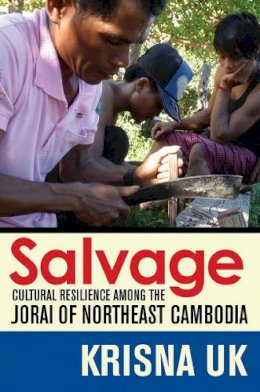
Salvage: Cultural Resilience among the Jorai of Northeast Cambodia
Krisna Uk
In Salvage, Krisna Uk draws on extensive research in a Cambodian village she calls Leu to provide a unique ethnography of the Jorai, an ethnic minority group that lives in Vietnam and in the most heavily bombed region of northeast Cambodia. The Jorai inhabit a remote region largely beyond the reach of the nation-state but have suffered the devastating effects of battles between and within states. Uk focuses on the experience of a Jorai community that experienced violent and protracted international and domestic conflicts—the Vietnam War and the Khmer Rouge regime. These conflicts had enduring effects on the community's moral fabric, the villagers’ activities, and the physical and spiritual environments with which they engage daily.Uk’s ethnography is an exploration of a resilient communal life that refuses to surrender its integrity to the blind, destructive forces of modern aerial warfare and that struggles to come to terms with the unintelligible violence unleashed by Cambodia’s revolutionary movement. It examines the destructive power and enduring harm that explosive remnants of war inflict on the human body and the social relations. But it also reveals how the local Jorai villagers turn these treacherous and fatal products of foreign technology into precious subsistence items as well as aesthetic and ritualistic objects that will take the souls of the dead on their journey to a better life. Uk demonstrates how the Jorai of Leu can, through their creative and traditional labor, revive the legend of the formidable Jorai warriors by transforming deadly modern weapons into their own war trophies.
Product Details
About Krisna Uk
Reviews for Salvage: Cultural Resilience among the Jorai of Northeast Cambodia
Kurt Borchard, University of Nebraska Kearney
Historical Geography
Uk's book [is] a pioneering anthropological study of an ethnicity that has been at the fulcrum of major historical events for many decades. The author has set a high mark for those who will, we can only hope, enjoy further opportunities to undertake ethnographic research with the minority communities of Cambodia, Laos, and Vietnam.
Pacific Affairs
